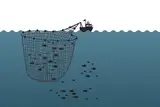Stay up-to-date on the latest developments from our world! Our news section is where you will find updates and insights.
Our mission needs your support
Your generosity can help ensure that our vital work on behalf of aquatic species continues uninterrupted. Please consider donating today so we may upkeep and expand our online database!
fair-fish international association
CHF: CH68 0900 0000 8503 8259 6
EUR: CH51 0900 0000 9136 2602 9
BIC: POFICHBEXXX
Bank: PostFinance, 3030 Bern, Switzerland
2025-10-30

After Seriola lalandi, we now also updated the WelfareCheck of the related Seriola dumerili, the Greater amberjack. The WelfareCheck | farm got the current design of the common age class and label structure for each criterion; we added latest research and applied the recent scoring rules.
This lead to a change in almost all scores. Most notably, we could not maintain the formerly high score in reproduction under high-standard farming conditions, even though we found hints that natural spawning without hormonal manipulation is possible in captivity. Further research is needed to find out whether farmers also refrain from extracting eggs and milt under anaesthesia. Second, we could not confirm the high score for stunning and slaughter, as we did not come across a protocol being applied in farms. This, too, requires further research. If you have more information about these and other knowledge gaps, please contact us!
All in all, Seriola dumerili gained a low WelfareScore – partly due to missing information, but partly also due to an extensive space need, a hint on aggression, and the open question whether the species would thrive with environmental enrichment. Curious? Find all we collected on Seriola dumerili here.
2025-10-01

The catch branch of the fair-fish database (on fisheries) has one more WelfareCheck to show: We recently added Mullus surmuletus caught with set nets. This Striped red mullet is a popular species in the Northeast Atlantic and the Mediterranean which yields a high price on the market. Until it is sold, it runs through a number of potentially stressful catching steps. First and foremost, this is the catching itself which entails being entangled for some time without being able to escape and potentially fall prey to predators.
It is possible that most of the individuals emerging to the vessel are already dead or dying within minutes after being disentangled. Further research is needed on that. The ones who are not dead continue to experience emersion to air and handling during sorting and storing until they eventually die from asphyxiation. Find the details of this in the profile as well as mitigation measures that could help improve the situation.
Do you have comments or hints for us on Mullus surmuletus caught with set nets or the database in general? Let us know in the contact form!
2025-09-13

We would like to get more people to know the fair-fish database, so we look for ways to spread the word. On September 11th, there were two opportunities for this. In Bristol/UK, database team member Paolo Panizzon represented us in the 9th Annual Meeting of the AWRN (Animal Welfare Research Network). The UK has spawned many NGOs and research departments working on welfare in animals, so we were grateful to be accepted to talk and connect with this network. As one topic was "Wild Animal Welfare", we took the chance to pitch our fisheries part of the fair-fish database – the catch branch.
On the same day, in a new edition of the fair-fish Online shoal, the Carefish/catch consortium presented the main outcomes from the 4 year run as the project is coming to a close. The catch branch of the fair-fish database is fair-fish's contribution to this endeavour to promote better fishing standards. Please find here the presentations of the project partners and the highlights of all achievements. In the final discussion, one participant mentioned we should make sure to get the next generation of scientists on board. The fair-fish database can contribute to this. By pinpointing knowledge gaps in welfare research of aquatic species, this can be a good starting point to find a topic for a bachelor's, master's, or PhD thesis. If you have used the database in some form for your work, we would be delighted to hear from you!
2025-08-19

Our new WelfareCheck | farm is on Colossoma macropomum or Tambaqui, a tropical freshwater species from South America, especially farmed in Brazil. The worst case scenario looks bleak with the individuals being put in too small and too shallow systems, being manipulated to spawn, being put in too high densities, and because the species tends towards aggression during feeding, prefers substrate, is stressed by husbandry, and most likely dies without proper stunning and slaughter. Especially ponds can at least offer an overlap with wild spatial needs and provide substrate; aggression does not seem to be a major issue, since polyculture works; stress can be reduced through measures verified in the farming context.
Overall, this is not a good situation for a species of which up to 200 million individuals are farmed each year. Further research could help fill in the blanks, but the question remains whether a species that does not readily reproduce in captivity, has an urge to migrate, and lives solitarily except for the spawning season will ever be able to achieve high welfare in a reasonable amount of criteria. For all feedback on the WelfareCheck or other comments on the fair-fish database, please contact us.
2025-07-30

We have given the fair-fish database website a major makeover in 2025 – including content but also style changes. You will find more information in previous news posts. The latest addition is a short video tour that introduces you to the main features we have to offer and where to find them. In just about 3 minutes, you will see how to navigate the website and what to expect. It is the most convenient way to get to know the fair-fish database! Please find the video tour on the homepage as the last entry of "What you can find here".
There is more to discover than shown in the video, however. And we are always evolving. So check in with us again and get in touch if you have suggestions or feedback.
First up, you will find answers to questions for the specific page you are on. Scrolling down in the FAQ window, there are also answers to more general questions. Explore our website and the other sub pages and find there the answers to questions relevant for those pages.
In the fair-fish database, when you have chosen a species (either by searching in the search bar or in the species tree), the landing page is an Overview, introducing the most important information to know about the species that we have come across during our literatures search, including common names, images, distribution, habitat and growth characteristics, swimming aspects, reproduction, social behaviour but also handling details. To dive deeper, visit the Dossier where we collect all available ethological findings (and more) on the most important aspects during the life course, both biologically and concerning the habitat. In contrast to the Overview, we present the findings in more detail citing the scientific references.
Depending on whether the species is farmed or wild caught, you will be interested in different branches of the database.
Farm branch
Founded in 2013, the farm branch of the fair-fish database focuses on farmed aquatic species.
Catch branch
Founded in 2022, the catch branch of the fair-fish database focuses on wild-caught aquatic species.
The heart of the farm branch of the fair-fish database is the welfare assessment – or WelfareCheck | farm – resulting in the WelfareScore | farm for each species. The WelfareCheck | farm is a condensed assessment of the species' likelihood and potential for good welfare in aquaculture, based on welfare-related findings for 10 crucial criteria (home range, depth range, migration, reproduction, aggregation, aggression, substrate, stress, malformations, slaughter).
For those species with a Dossier, we conclude to-be-preferred farming conditions in the Advice | farm. They are not meant to be as detailed as a rearing manual but instead, challenge current farming standards and often take the form of what not to do.
In parallel to farm, the main element of the catch branch of the fair-fish database is the welfare assessment – or WelfareCheck | catch – with the WelfareScore | catch for each species caught with a specific catching method. The WelfareCheck | catch, too, is a condensed assessment of the species' likelihood and potential for good welfare – or better yet avoidance of decrease of good welfare – this time in fisheries. We base this on findings on welfare hazards in 10 steps along the catching process (prospection, setting, catching, emersion, release from gear, bycatch avoidance, sorting, discarding, storing, slaughter).
In contrast to the farm profiles, in the catch branch we assess the welfare separately for each method that the focus species is caught with. In the case of a species exclusively caught with one method, there will be one WelfareCheck, whereas in other species, there will be as many WelfareChecks as there are methods to catch the species with.
Summarising our findings of all WelfareChecks | catch for one species in Advice | catch, we conclude which catching method is the least welfare threatening for this species and which changes to the gear or the catching process will potentially result in improvements of welfare.
Welfare of aquatic species is at the heart of the fair-fish database. In our definition of welfare, we follow Broom (1986): “The welfare of an individual is its state as regards its attempts to cope with its environment.” Thus, welfare may be perceived as a continuum on which an individual rates “good” or “poor” or everything in between.
We pursue what could be called a combination of not only a) valuing the freedom from injuries and stress (function-based approach) but b) supporting attempts to provide rewarding experiences and cognitive challenges (feelings-based approach) as well as c) arguing for enclosures that mimic the wild habitat as best as possible and allow for natural behaviour (nature-based approach).
Try mousing over the element you are interested in - oftentimes you will find explanations this way. If not, there will be FAQ on many of the sub-pages with answers to questions that apply to the respective sub-page. If your question is not among those, contact us at ffdb@fair-fish.net.
It's right here! We decided to re-name it to fair-fish database for several reasons. The database has grown beyond dealing purely with ethology, more towards welfare in general – and so much more. Also, the partners fair-fish and FishEthoGroup decided to re-organise their partnership. While maintaining our friendship, we also desire for greater independence. So, the name "fair-fish database" establishes it as a fair-fish endeavour.





